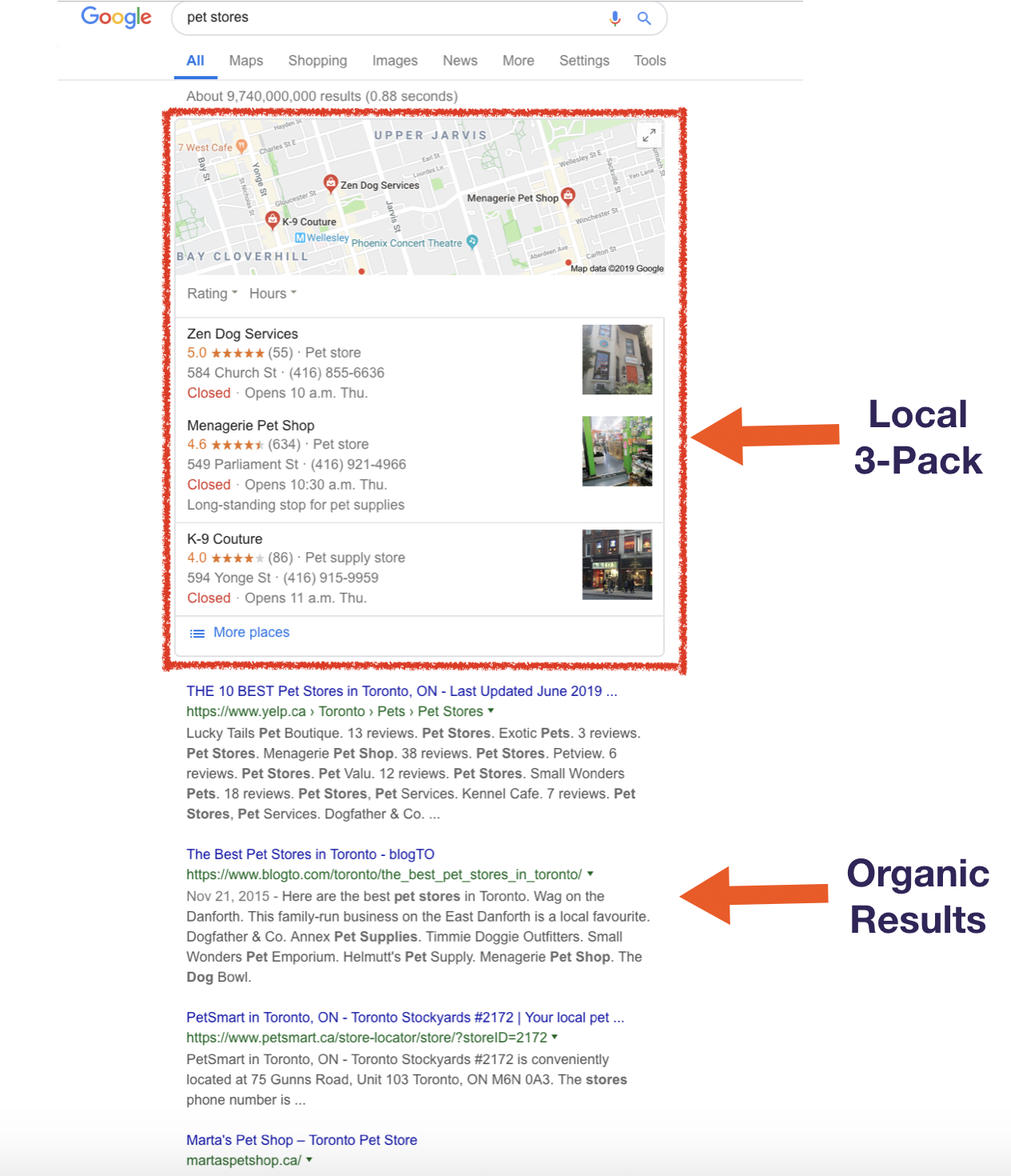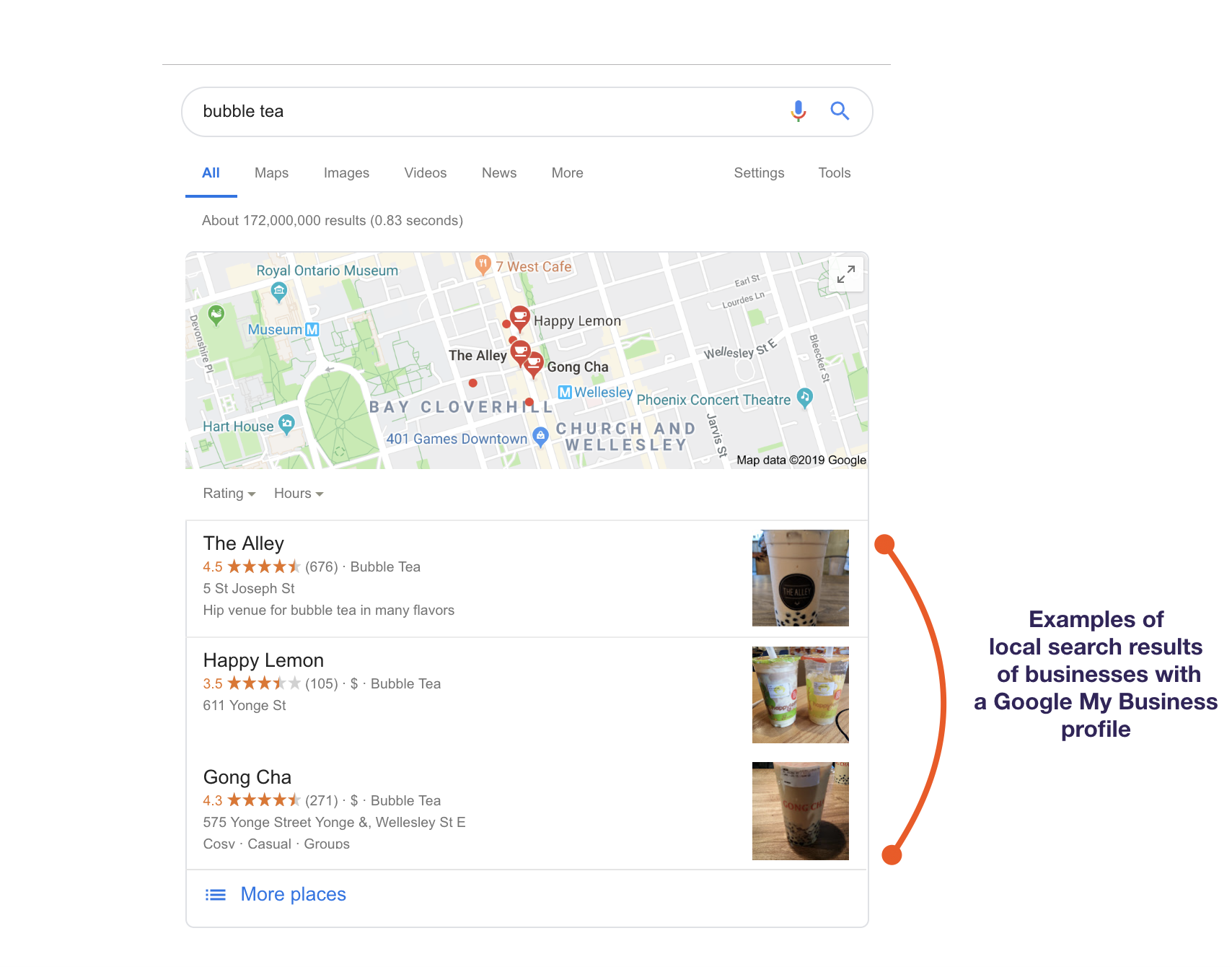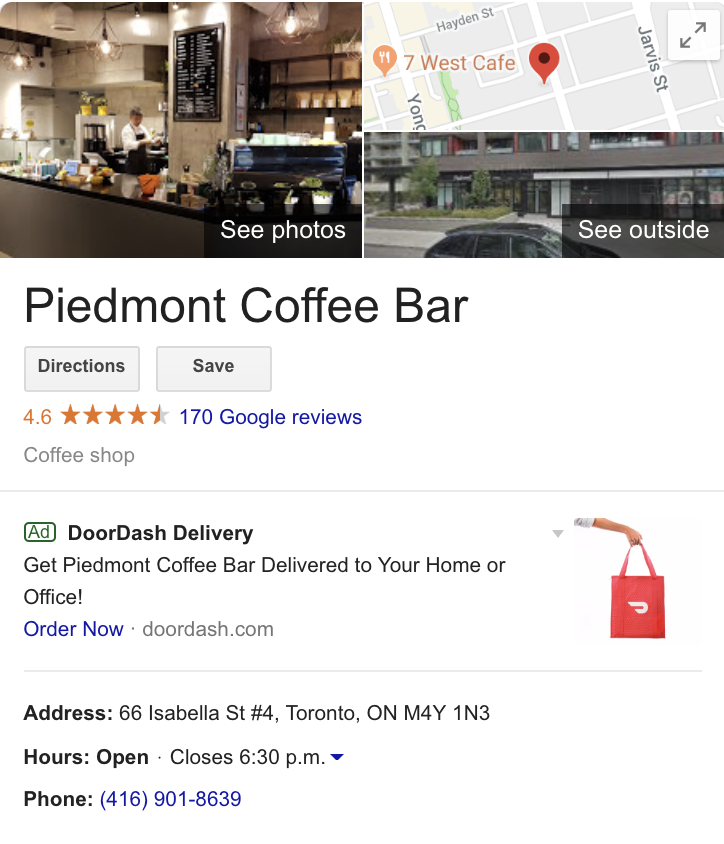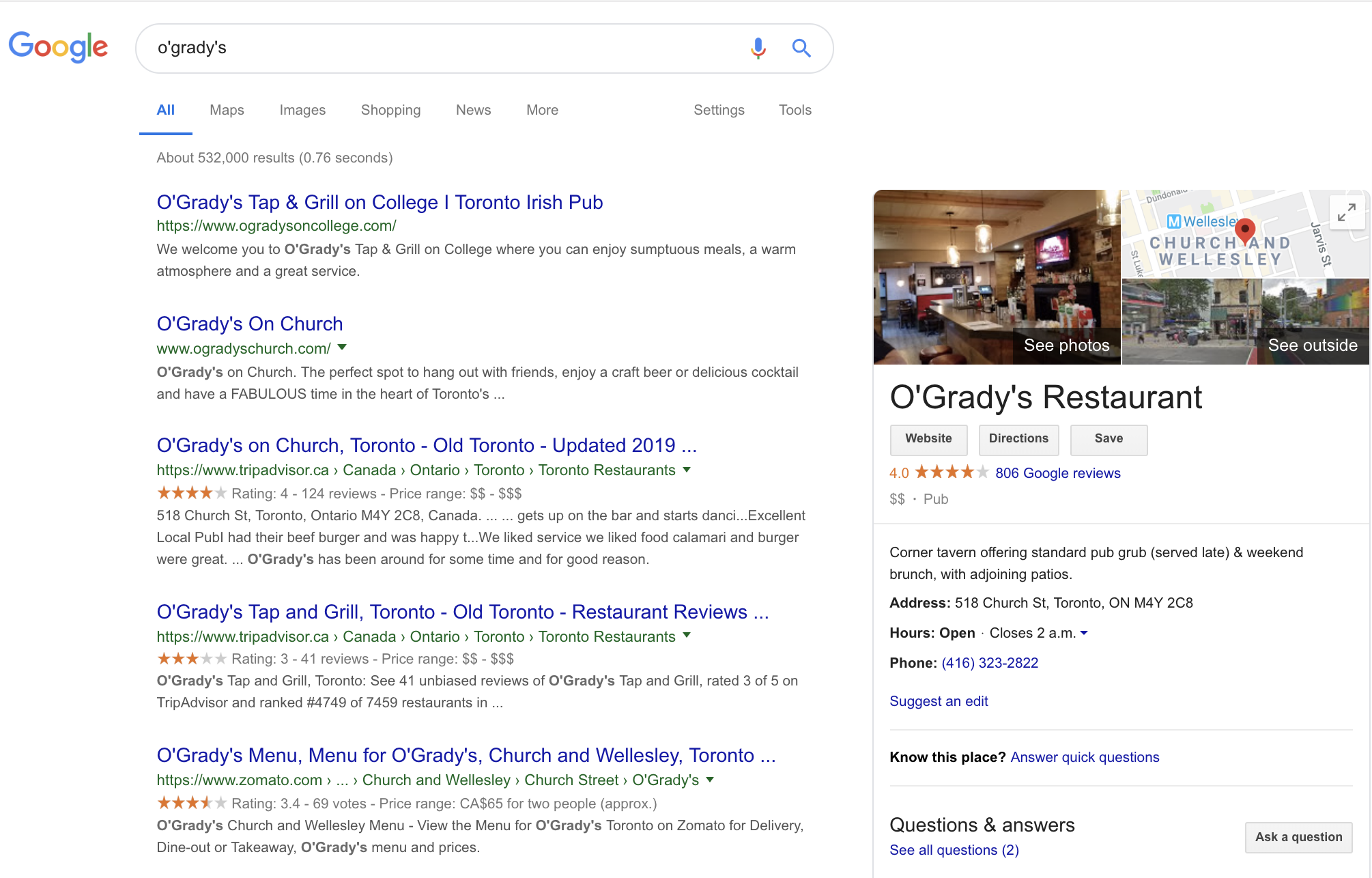When the marketplace is packed with choice, how do you get a consumer to notice your local business first? Boost the online visibility of your business to potential customers with strategic local SEO.
How do you show up in local search when similar businesses in your area also compete for your customer’s attention and business? An effective way to stand out from the competition and draw customers your way is to optimize your web presence for local search.
Google, the most widely used search engine in Canada, localizes search results based on the searcher’s geo-location. Along with the distance or proximity factor, the relevance and prominence of a business also dictates its rank in local search results on Google Maps and Google Search.
So, the success of a local business and its ability to attract potential consumers within its neighbourhood depends on optimizing its online presence for distance, relevance and prominence. In this beginners guide, we break down these three search engine ranking factors into actionable steps that will optimize your business for local search.
What is Local SEO?
Local Search Engine Optimization (SEO) refers to a set of practices that optimize a business’ online presence so local searchers in the area can discover it quickly and easily.
Search engines want to give the user exactly what they want. Google shows local results for queries with a local intent. For example, if you run a nail salon, you need to optimize your online presence for queries like “nail salons near me” to direct that customer to your location.
With local SEO, you help search engines understand your business better to recommend you as an option to the searcher.
Local SEO, is therefore applicable to businesses with a physical location like a sushi restaurant or those that travel to their customer like a lawn mowing service.
Local SEO is an effective marketing tool that promotes a business at the exact time a consumer is searching for them or for products or services they provide.
Why does my business need Local SEO?
While traditional SEO is important for the overall discovery of your website by the search engines, you must complement it with local SEO to rank for local keywords and for faster discovery.
Google, which corners 92% of the world’s search engine market share, recorded these observations about consumers’ local search behaviour in a study.
- 4 in 5 consumers use search engines to find local information
- 50% of smartphone consumers visit a store within a day of their local search
- 76% of local searches result in a phone call
- 18% of local smartphone searches led to a purchase within a day compared to 7% of non-local searches
Evidently, local SEO is key to driving people to your storefront. Consumers want and act on location-based information that’s customized to their city, postal code or immediate surroundings. Without local SEO, your business risks being hidden beneath a pile of search results. If your business is not on the first page of a search engine results page (SERP), you lose your competitiveness.

Google’s local 3-pack
Google displays search results as a combination of a local pack and organic results. The local pack consists of top three local business listings most relevant to the search query, highlighted in a box with their locations pinned on an accompanying map. The rest are regular organic results.
The 3-pack shows up in 93% of searches with local intent. As a business, your SEO efforts should focus on appearing in this coveted section of a search engine results page (SERP).
Tips to help your business appear in local search results
To implement local SEO for your business, first ensure you meet the basic requirements of traditional SEO. Your website must be mobile-friendly, easy to use, peppered with useful and relevant content, and should have built domain authority with quality backlinks. Building a website is quick and easy when you use online website builders. There are ten considerations to factor in when you choose one for your business.
Everything that applies to traditional SEO also applies to local SEO. Learn how to rank in organic search results in our SEO checklist for businesses
While the motive of organic SEO is to get a website to rank well in a SERP for specific keywords regardless of the searcher’s location, local SEO is geared towards increasing rankings for a website in a limited geographic area. Here are a few actionable steps to appear in local search results on Google.
Local SEO Tip #1: Create a Google My Business profile
When people look for businesses and places on Google Search or Maps, they’re shown local results based on their geo-location. Google pulls in information from businesses listed with them through their Google My Business feature

According to SEO experts, your website is no longer the first impression on your customers. The de facto home page of most local businesses today is the knowledge panel that shows up against your business name on Google. That knowledge panel is the Google My Business profile.

All the people that used to go to your website to get your phone number or your address, get directions, check out pictures of your business or read testimonials, they can see all of that in your Google My Business profile.
All the people that used to go to your website to get your phone number or your address, get directions, check out pictures of your business or read testimonials, they can see all of that in your Google My Business profile.
Your business may get overlooked in relevant local searches in your area if you don’t have a Google My Business profile.
What is Google My Business?
Google My Business (GMB) is a free tool to manage how your local business appears on Google Search and Google Maps. You need to create and maintain your Google My Business listing to help potential customers discover your products or services, contact you, and find your location.
Verified businesses on Google are twice as likely to be considered reputable by users.
Benefits of a Google My Business profile
- Attract new customers in the area you serve
- It points customers to your website
- Interact with customers by posting photos of your business, products, and services
- Collect and respond to reviews from customers
- Maintain accurate information about your business, for example, hours of operation, web address, phone number, location
- Use mobile app to keep your online presence up-to-date
- Location-based ads to reach a wider audience
Local SEO Tip #2: NAP or Name, Address, Phone Number
The purchase journey of a customer plays out across different devices today. It may start on the smartphone and end on the desktop. The search and discovery experience of users should be consistent at every touchpoint of their journey, from the search engine, to the storefront, a mobile app, google maps, or information on another retailer’s website or app.
What is NAP?
NAP stands for Name, Address, Phone Number and is crucial to rank well in local search engine results. Google uses your NAP data to deliver geo-targeted search results. Google and other search engines also cross-reference your NAP information throughout the web to check whether you’re a legitimate business or not. With NAP, you address the local search ranking factors of distance and relevance.
Consistency and Breadth of NAP
Conflicting NAP data, multiple business names or different phone numbers confuses your identify for search engines. NAP helps them understand who you are, what you do, and how users can contact and reach you. Your Business’ NAP should be consistent across your website, your social media profiles and everywhere else on the web.
Also, work on expanding the breadth of your NAP through citations. A citation is any mention of your business and its NAP on the web. By listing your business on online directories like Google My Business, Yelp, Yellow Pages, Foursquare and other sources of citations like Apple Maps, Bing Places, among others, you establish trust in the search engine’s algorithm, and over time build local relevance and authority.

Local SEO Tip #3: Reviews
The reviews customers leave for your business and how they rate your service influence how you rank in a SERP. Prominence, the third ranking factor of local search results, is fulfilled through reviews.
High-quality positive reviews and high ratings work like a ranking signal for Google, increasing your chances of getting featured in its local 3-pack and even as rich snippet reviews that have good click-through rates.

The more positive reviews a business gets, the higher its chances to rank in Google’s local 3-pack. Reviews from other platforms also get featured in normal organic results as rich snippet reviews that help with your click-through rates.
68% of consumers are more likely to use a local business based on its positive reviews. To build your online reputation –
- Make it easy for your customers to review you. The Google My Business profile is one location, but also maintain a presence on other popular review platforms like TripAdvisor, Yelp, Yellow Pages, Facebook etc.
- Collect email addresses at the time of service and send a request for a review later
- Handout a card or a flyer after the service to encourage a review
- Use social media to ask specific questions from your customers
Tools and Resources for local SEO
To help improve your local search rank, there are several online services available for a one-time or monthly fee.
Whitespark – Their services are focused on improving your online citation profile and increasing your local search rankings from google
Moz Local – This tool manages your NAP, its distribution, and accuracy. Moz Local also distributes your location data across the search ecosystem and helps search engines and in turn new customers find your local business.
Bright Local – Their local SEO tool lets a business track movements in its local search ranking, citations, and manage the Google My Business profile.
SEMrush – This is another prominent tool to monitor your position on a SERP, it correctly distributes your business data to authoritative directories, tracks ratings and reviews, and also audits your website to check if google can crawl it or not.
Local SEO is a long-term effort and the tips we’ve discussed in this blog are a small start. The above mentioned tools can perform an overall audit of your online activities to identify opportunities to improve the performance of your business in local search.
Remember, the guiding principles for all your local SEO tactics for Google centre around how google determines local rankings –
- Distance: How close is your business to the searcher?
- Relevance: Is the search query a relevant match for your products and services?
- Prominence: How well-known are you as a business? What do other consumers say about your products and services?
Whether your business is a sole proprietorship or a corporation, a key factor to success and making it profitable is ensuring you optimize it for local SEO. Ownr offers the simplest and most convenient way to register or incorporate your business and build your brand
If you have questions about how Ownr can help you register or incorporate a business, or any of our promotions, give our customer success team a call at 1-800-766-6302. You can also reach us at support@ownr.co. We’re available Monday through Friday, 9 a.m – 5 p.m EST.
You also have the option to book a free 30-minute information session to ask all your questions 1:1 with a member of our customer success team. Schedule a session here.
This article offers general information only, is current as of the date of publication, and is not intended as legal, financial or other professional advice. A professional advisor should be consulted regarding your specific situation. While the information presented is believed to be factual and current, its accuracy is not guaranteed and it should not be regarded as a complete analysis of the subjects discussed. All expressions of opinion reflect the judgment of the author(s) as of the date of publication and are subject to change. No endorsement of any third parties or their advice, opinions, information, products or services is expressly given or implied by RBC Ventures Inc. or its affiliates.


